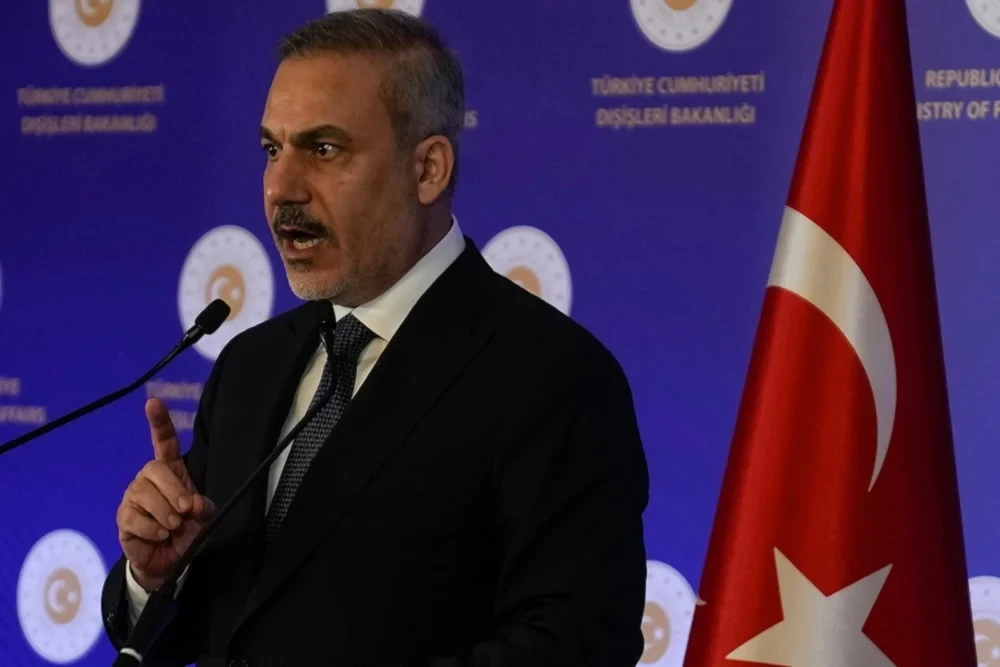Turkey’s rising military role cements its value to European security
The Financial Times explores how Turkey’s military power and defense industry are redefining its strategic ties with Europe and NATO.
-

Turkey's Foreign Minister, Hakan Fidan, answers questions from media members during a press conference in Istanbul, Turkey, January 10, 2025 (AP)
Turkey’s defense clout is reshaping its strategic position in Europe, according to The Financial Times.
Turkey’s military resurgence, underpinned by a self-sufficient defence industry and a posture of assertive diplomacy, has become too strategically important for Europe to ignore.
While NATO recalibrates in response to Russian aggression, Turkey has emerged as an indispensable security actor, even as concerns grow over Erdoğan’s domestic authoritarian drift.
President @RTErdogan met with NATO Secretary General Mark Rutte at the Presidential Complex. pic.twitter.com/RJaOyqzOTF
— Presidency of the Republic of Türkiye (@trpresidency) May 13, 2025
The Financial Times described how Turkey, once sidelined by stalled EU accession talks, is now seen as a frontline guardian of NATO’s south-eastern flank. Erdogan, sensing this geopolitical shift, recently declared that “European security cannot be thought of without Turkey... especially with its defence industry,” even as Western governments offered little criticism after the arrest of opposition leader Ekrem İmamoğlu.
From Turkey controlling Black Sea access routes to deploying its forces in conflict zones such as Libya and Somalia, Turkey’s military has been battle-hardened. Rathbone and Foy emphasize that, in contrast to Europe’s slow mobilization of forces, the Turkish army, NATO’s largest on the European continent with 355,000 active troops, could swiftly field an effective peacekeeping operation if asked to do so in Ukraine.
Erdogan’s approach to the Ukraine war remains “balanced,” maintaining open trade and diplomacy with Moscow while simultaneously supplying Kiev with military support. This balancing act boosts Erdogan’s leverage in Brussels as he attempts to reopen EU negotiations, according to the Financial Times.
Turkey’s expanding role in Ukraine and NATO
Turkey’s defense contributions to Ukraine also show its rising military value. According to Rathbone and Foy, state-owned firms STM and ASFAT are building corvettes for Ukraine’s navy, while privately held Repkon is exporting artillery production lines to the US and Germany.
Baykar, which initially supplied drones to Ukraine at the start of the Ukraine-Russia war, recently announced a joint venture with Italy’s Leonardo to expand into Europe’s growing drone market.
Hakan Fidan, Turkey’s foreign minister and former intelligence chief, now joins regular EU defence discussions. NATO foreign ministers are also due to convene in Turkey this week, a signal of Ankara’s embeddedness in European security.
A thriving defense industry amid economic pressure
Turkey’s defense sector has also grown rapidly, with exports reaching $7.2 billion last year. Finance Minister Mehmet Şimsek recently told the Financial Times that Turkey is among the few countries able to meet Europe's rising defence spending, forecasted at €800 billion.
Yet, the boom comes with structural challenges. While Turkish firms are scaling their operations and expanding, sustainability issues, capital constraints, and a growing brain drain persist. “Turkey is trying to tell Europe: ‘Look at what we can do, and how well we can do it,’” says Tom Waldwyn of the IISS, who notes that European investment may be crucial to keeping the momentum alive.
Security needs outweigh democratic concerns
Europe’s engagement with Turkey is increasingly governed by geopolitical necessity rather than shared democratic values, according to the Financial Times. While the European Parliament recently criticized Erdogan’s push “towards a full authoritarian model,” Brussels shows little interest in reviving EU accession talks.
FT recalls how even Imamoglu, from his jail cell, pleaded with Germany not to block a proposed Eurofighter jet deal with Ankara. “Turkey is not just about Erdogan,” he wrote on X. “Governments come and go.”
Both Turkey and Europe are leaning into mutual dependence, even if uneasily. Turkey’s military weight, strategic location, and defense industry make it an unavoidable partner in European security.

 4 Min Read
4 Min Read










